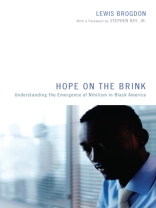African Americans have always wrestled with hopelessness. Yet in the face of hopelessness, African Americans fought for hope that America can be a land of equality, opportunity, and justice. The fight for hope has been difficult and has taken a toll on African Americans. Today the signs of hopelessness abound in black communities across the nation as an increasing number of leaders express concern about a pervasive problem that they could not identify. Beyond the continuing injustices and inequities linked to systemic racism, they recognize a growing internal apathy in African Americans. This internal apathy is nihilism, the embrace of nothingness, meaninglessness, and internalized oppression. Nihilism has been slowly emerging since the 1980s and is the reason there is an increasing number of blacks who turn to defeating and destructive behaviors that only worsen their plight. In nihilism’s wake, leaders and communities are left trying to help people who have turned on themselves and abandoned hope that things can get better.
The first step toward hope requires an understanding of hopelessness. Only then can we step into a world that pushes people to the brink and hope to make a difference. Hope on the Brink offers an exploration into this hopelessness.
Over de auteur
Lewis Brogdon is an associate professor of Black church studies and the director of the Institute for Black Church Studies at the Baptist Seminary of Kentucky in Louisville. He is the author of several books, such as A Companion to Philemon, The Spirituality of Black Preaching, The New Pentecostal Message? An Introduction to the Prosperity Movement, and Hope on the Brink: Understanding the Emergence of Nihilism in Black America, and numerous articles and book chapters.







![Hoes van Brian Schrag & Julisa Rowe: Community Arts for God's Purposes [Chinese] 貼近神心意的社群藝術 Hoes van Brian Schrag & Julisa Rowe: Community Arts for God's Purposes [Chinese] 貼近神心意的社群藝術](https://static.worldofdigitals.com/thumb_webp/740/9781645083740.webp)




